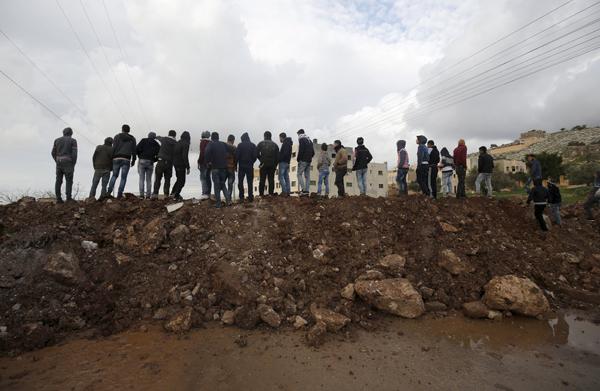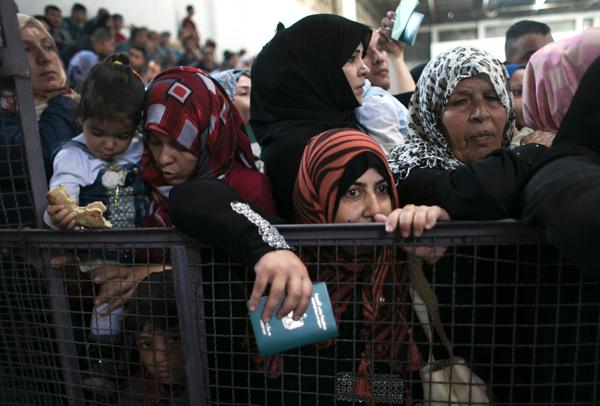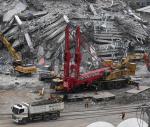You are here
For many Palestinians, Israel settlement work the only option
By Reuters - Feb 22,2016 - Last updated at Feb 22,2016

Palestinians gather as they watch Israeli forces in the West Bank town of Qabatya, near Jenin, on Monday (Reuters photo)
QIRA, West Bank — Mohammad Arbassi, a 56-year-old father of five sons from the West Bank village of Qira, has a diploma in finance and big plans for his children, two of whom are at university.
Yet despite his education and personal drive, for the past 12 years he has worked as a builder on construction sites in the Israeli settlement of Ariel, not far from his village, earning 150 shekels a day ($38). It's the best job he can get.
"You ask why I would accept such a poor job," he says, pursing his lips. "I will say I didn't have a better offer."
Around 36,000 Palestinians work in settlements in the occupied West Bank, many in construction, earning up to three times as much as the average Palestinian wage.
Many of the jobs are in large settlement blocs built close to the frontier with Israel, in areas Israel intends to keep in any final peace agreement with the Palestinians.
It is here that Israel has established one of several industrial zones, comprising around 1,000 businesses in all, many of which benefit from tax breaks and other business concessions, including access to cheaper Palestinian labour.
In a report released last month, Human Rights Watch labelled the zones "Occupation, Inc.", pointing out that they are in violation of international law because they are built on land Israel occupied in the 1967 Middle East war.
The zones, the report said, contribute to a two-tiered system that "provides preferential treatment to Jewish Israeli settlers while imposing harsh conditions on Palestinians". In many cases they also use Palestinian resources, especially quarries in the West Bank.
West Bank businesses deny exploiting Palestinian workers and say they offer much needed employment.
Israel disputes that its settlements are illegal and says the final status of territory it occupied nearly a half-century ago should be determined in peace talks with the Palestinians.
More money, no benefits
Arbassi and others like him feel there is little choice but to do the work, even if it makes them uncomfortable. The Palestinian economy is struggling, with unemployment at 27 per cent. While settlement jobs may offer no overtime, pension or work insurance, the higher wages offset the shortfall.
"Palestinians pay only 70 or 80 shekels a day for work in Palestinian areas," said Arbassi, pointing out that a kilo of meat, the amount needed to feed his sons, costs 70 shekels.
Ouda Daqdouq, 26, has worked various settlement jobs since he was 16, earning up to 250 shekels a day. Now married with two children, he can't afford to stop, even if it frustrates him.
"I had an accident while at work in the settlement of Borkan and I could not work for a week, but there was no insurance and they didn't compensate me," he says. "There is no choice. We work in settlements so we can feed our children."
Shaher Saed, the general secretary of the Palestinian Workers Union, is quick to acknowledge the dilemma.
"In principle, we would prefer to stop people working in settlements," he told Reuters, saying around half the 36,000 Palestinians doing the work don't have proper permits.
"What reinforces the situation is the trade between settlements and the private sector," he said. "Even in some settlement industrial zones, there are partnerships with Palestinian [businessmen]."
Israelis frequently point out that settlement businesses benefit Palestinians by paying them more. But Saed calls it a false argument, one that excuses the occupation and undermines the ability of Palestinians to develop their own economy.
"It does not help a worker build a decent job," he said. "It is not an organised working environment and at the end of the day, Palestinian workers are being exploited."
Related Articles
GAZA — Egypt opened its border with Gaza for the first time in three months on Wednesday, giving Palestinians a two-day respite from a closu
HEBRON, West Bank — At the peak of a searing summer, Palestinians living in parts of the Israeli-occupied West Bank are suffering from sever
OCCUPIED JERUSALEM — Companies operating in Israeli settlements in the occupied West Bank contribute to "an inherently unlawful and abusive



















